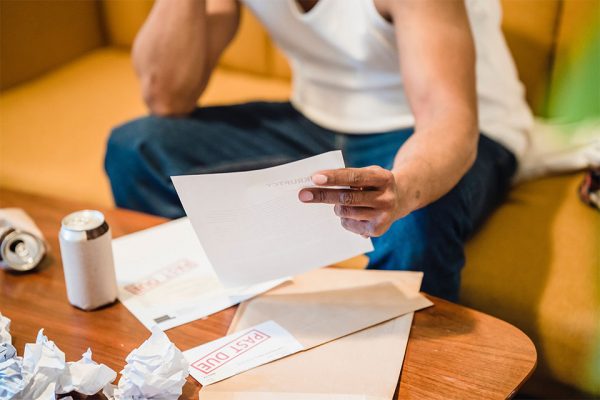
Getting out of debt is hard, but it’s easier if you have a plan. The right strategy can help you get back on track and reduce your monthly payments so that you can finally pay off your debts. In this post, we’ll go over some specific steps you can take to get out of debt faster than ever before!
1. List All Your Debts
The first step to getting out of debt is to figure out how much you owe and what the interest rate is. To do this, list all your debts on a piece of paper or in a spreadsheet. Include:
- The name of the creditor (website, store)
- The amount owed in total dollars and cents (you can get this from your bank statement)
- How much interest will accrue each month on that debt. If you’re unsure how much money is needed every month just estimate based off of previous payments made. If there’s no way to know exactly when they’ll be due again like with credit cards then don’t worry about it too much. Just make sure they’re paid as soon as possible!
If there are any fees associated with this loan or line of credit (like late fees), add those numbers into their own columns so that we can easily see how costly it might turn out to be over time.
You can check out this GoodCheddar guide for more tips on how to get out of debt and keep reading below.
2. Decide How Much You Can Pay per Month
- Make a budget.
- Decide how much you can afford to pay per month.
- Make sure you can afford to pay your bills and all other expenses, including rent or mortgage, car payments (or at least a down payment on one), credit card debt, and student loans.
If there are other debts that aren’t being taken care of with the current budget then it may be time for some serious thinking before looking at any new debts! Do not use credit cards as an excuse for not being able to pay off old debts.
If they’re still outstanding then they will continue eating away at whatever savings/investments have been made into paying them off in full.
3. Negotiate Your Interest Rates
The first thing you can do is get a lower interest rate. This will help reduce the amount of money you owe on your debts, but it also means that it will take longer to pay off your debt.
If you’re able to negotiate with creditors, they may be willing to give you a lower interest rate in exchange for paying them back faster or providing collateral (like an asset).
You could also refinance one or more of your debts with another lender—this would allow them to take less money from each monthly payment than what was previously agreed upon between both parties.
Finally, if all else fails and no one seems willing or able to reduce their rates enough for anyone’s liking, there are other options available such as using a debt consolidation loan (DC).
4. Make Sure to Pay Bills on Time
Pay Your Bills on Time Each Month.
This is a no-brainer, but it’s still worth repeating: pay your bills on time each month. If you can’t pay the full amount, make sure you pay the minimum required by law and don’t let them go to collections so that they don’t get tossed out of court.
f there’s any way possible to avoid having a late payment appear on your credit report as an unpaid debt, then do so. It will help keep creditors from harassing or suing you over past-due debts in the future!
5. Be Diligent Moving Forward
When you’re in debt, you need to be diligent about staying on track. You have to make a plan and stick with it, even if it means putting off other things that would help your situation. Don’t give up too easily. You’ll find that there are plenty of ways to keep yourself motivated along the way!
Once you’ve established your goal, it’s time for some hard work behind closed doors. Don’t be afraid to ask for help from those around you—and don’t hesitate when they offer their assistance either! It might take longer than expected but eventually, everything will pay off in sweet success.
Getting Out of Debt is Hard, But You Can Do It
Getting out of debt is hard, but with the right plan, you can do it.
The first step is to write down what you owe—and then prioritize your bills and make sure they get paid on time. If possible, try to negotiate with creditors for lower interest rates or better terms (like 0% balance transfer interest).
Doing this will help keep more money in your pocket while reducing the amount of money owed on any one account.
Pay off high-interest debts first: When choosing how much to pay each month toward paying down high-interest debt, consider what would happen if that extra money were put toward something else instead (like saving for retirement).
It’s important not just because it makes sense financially but also because keeping up with these types of accounts takes up so much time and energy that could otherwise be spent elsewhere—such as paying down other debts!
SUBSCRIBE FOR MORE! HERE’S WHY:
1. You get 7 free books
2. You get the best money & productivity articles
3. You get the latest updates – all in one email per week
You have Successfully Subscribed!
